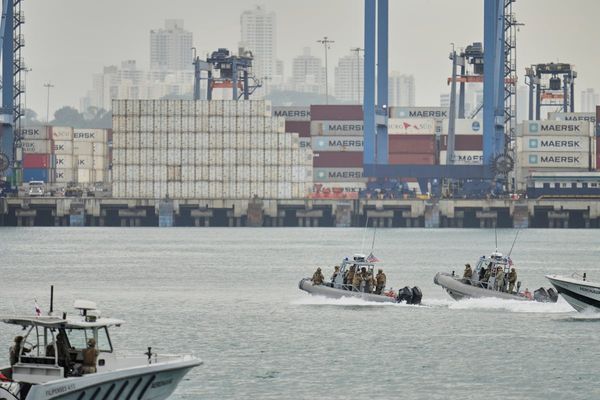
It was supposed to be an opportunity for local people to gather and share food. After more than two years of turmoil following the 2021 military coup, hundreds of locals from neighbouring villages had been invited to Pa Zi Gyi to celebrate the opening of a new village hall, which had been set up by the junta’s domestic opponents. Families – from young toddlers and pregnant women to grandparents – had set off early to attend.
The gathering on 11 April quickly became the scene of the deadliest airstrike by the Myanmar military since it seized power; 168 people, including 40 children and 24 pregnant women, were killed, according to the national unity government (NUG), which was set up by elected politicians and activists to oppose the military.
The attack began at 7.30am, when a military jet fighter bombed the area. Shortly afterwards, a helicopter gunship opened fire, according to the NUG. At 5.45pm, the junta’s air force returned again and attacked rescuers as they tried to search for survivors and recover the dead.
While the death toll was higher than previous strikes, such attacks are not uncommon. The military, which has struggled to suppress a determined armed resistance to its rule, has increasingly launched airstrikes, including against hospitals and schools.
“It’s not an isolated incident,” said Aung Myo Min, the NUG’s human rights minister.
The NUG has recorded more than 600 airstrikes between October 2021 and March 2023, he said. “We have recorded that the military targeted civilians, with knowledge that these are civilians, because they targeted the religious buildings; in some cases the attack was on the temporary medical centres that are providing humanitarian assistance.”
A day before Pa Zi Gyi, the military bombed a high school in Webula, Chin state, according to the independent outlet Myanmar Now. The school was closed at the time, but the headteacher and his wife, as well as seven others, were reportedly killed.
The military says it is acting to restore peace and stability, and that its attack on Pa Zi Gyi was part of counter-terrorism operations.
Last week’s violence has prompted renewed calls for stronger measures to stop the flow of aviation fuel and funding to the military. The weakness of the international response was empowering the military to continue its attacks, said Thinzar Shunlei Yi, a prominent anti-coup activist. “I think this is giving them impunity and a sense of confidence that the international community will always be paper tigers,” she said. “This must end.”
Soe Naing*, a 31-year-old goat herder who survived the attack on Pa Zi Gyi, remembers sitting inside the new village hall, looking at his phone last Tuesday morning. The hall had been set up by the local People’s Defence Force, the name given to volunteer armed groups that formed in response to military violence after the coup. Virtually everyone present was a civilian, Soe Naing said.
He said his mother had come into the building and taken his three-year-old daughter outside to eat. Then he heard a loud bang; everything was covered in smoke. Outside, where tents had been set up for families to eat, bodies were scattered.
“I came running out of smoke and started looking for my daughter desperately,” he said, adding that another military helicopter appeared and began shooting. He hid under a bridge. By the time he was able to emerge, the scene was one of devastation.
“I told myself to be strong. There was nothing much left, instead just piles of bodies on the ground, most dismembered, burnt and charred,” he said. “I then saw the tiny legs of an unborn child coming outside from a pregnant woman who was dead,.”
Soe Naing lost seven relatives in the attack, including his parents and his daughter, who he describes as a chatty girl who loved to sing. “I still can’t get her smiles out of my head yet,” he said. She was loved by everyone, he said.
Military-controlled Myawaddy TV said last week’s attack had occurred outside Pa Zi Gyi village, on a building that the NUG planned to use. The military struck a weapons storage facility, it said, and explosions from such weapons had added to fatalities. Those who died were resistance fighters, the junta spokesperson Zaw Min Tun said, adding that “people who were forced to support them probably died as well”.
The airstrike came just days ahead of Thingyan, the Burmese new year festival, normally a time of celebrations and splashing water in the streets. In Yangon, where the military held festive events in an apparent attempt to give an impression of normalcy, a sign was hung from a bridge that read: “Why are you dancing when the whole village is burning?”
Mass street protests are no longer possible in Yangon, which remains under military control.
Thurein, a 29-year-old resident of Yangon’s Mingalar Taungnyunt township, said the streets near to him were deserted. “We used to go to big pavilions and party with our friends. Now our country is sick, and there is nothing to celebrate,” he said.
The attack in Pa Zi Gyi was widely condemned, including by the US and the EU. However, activists say the international community has failed to take meaningful action.
Montse Ferrer, Amnesty International’s researcher and adviser on business and human rights, said that while some countries had imposed sanctions aimed at stopping jet fuel reaching the military, these generally targeted individual companies – something the military can easily evade. “A company that today is called ‘X’, tomorrow is called ‘Y’ and the sanction in many ways is no longer effective,” said Ferrer, who added that wider, sectoral sanctions were needed. Only Canada has taken this step.
Days after the attack at Pa Zi Gyi, the village stands deserted. Funerals for the victims, including Soe Naing’s relatives, have not yet been held because most of the residents worry about further military violence.
“Truthfully, no human being would engage in such a heinous act,” said Soe Naing. “They were not born as human beings.”
*Name has been changed for security reasons







